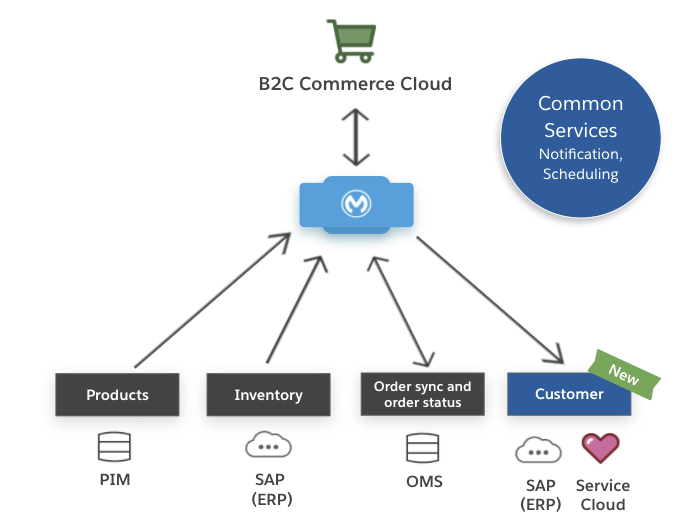In our previous blog, we explored how our latest update to MuleSoft Accelerator for Salesforce Commerce Cloud, a prebuilt integration solution consisting of integration assets and instructions, streamlines your order management and prepares you to take on new commerce delivery models. To keep up with innovations in Commerce, we’ve updated our Accelerator once more to synchronize customer information between Salesforce Commerce Cloud and ERP or Salesforce Service Cloud. This blog dives deeper into this update.
Customer service is key part of your commerce experience
Thirty percent global retail sales will be made through digital channels this upcoming holiday season as fewer consumers rush to physical stores. With an increase in digital orders, consumers are expected to engage with service agents 30% more this holiday season. For example, a consumer may update their address online and call an agent to verify these changes. The agent needs the most accurate customer information at their fingertips to provide fast and personalized service — which has become the expectation for customers. However, the agent most likely has older customer information due to lack of synchronization between ERP or Service Cloud — the system agents use — and Salesforce Commerce Cloud. Custom code, though time-consuming, is one approach to connecting these systems together. A faster, more efficient approach is to use pre-built APIs, templates, and reference architecture packaged in our newest release of MuleSoft Accelerator for Salesforce Commerce Cloud.
(NEW) Introducing customer information support from MuleSoft Accelerator for Commerce Cloud
Today, we are making it easier for you to share the most up-to-date customer information from Commerce Cloud to the places that needed it the most — your ERP and Service Cloud. MuleSoft Accelerator for Commerce Cloud now includes prebuilt integration assets to synchronize core customer profile attributes such as name, email and address from Commerce Cloud to your ERP or Service Cloud in real-time.

With the newest addition, MuleSoft Accelerator for Salesforce Commerce Cloud now includes pre-built APIs, connectors, reference architecture, integration templates, and step-to-step instructions for the following use cases:
- Orders and order status sync with OMS integration: push new orders from Commerce Cloud to an external OMS and pull customer order status accurately from an external OMS from Commerce Cloud on a scheduled basis as set by your organization.
- Product information sync with PIM integration: search for product deltas in a product information management (PIM) system and reflect those changes in Commerce Cloud on a scheduled basis as set by your organization.
- Inventory sync with ERP: search for inventory availability data in SAP, as an example ERP, from Commerce Cloud on a scheduled basis, set as appropriate for your company.
- Customer profile sync with ERP or Salesforce Service Cloud: push core customer profile attributes such as name, email, and addresses from Commerce Cloud to ERP or Service Cloud in real-time.
Discover all the assets included in Accelerator via MuleSoft Anypoint Exchange. Use the assets as they are, or extend them to meet your company’s unique needs.
With MuleSoft Accelerator for Salesforce Commerce Cloud, delivering connected commerce experiences is faster and easier than ever before!
Too good to believe? See Accelerator in action on Nov 4th!
Interested to discover more?
- Tune into our webinar to learn about the newest Accelerator updates, see a live demo of the solution, and ask our engineers your questions.
- Visit MuleSoft Anypoint Exchange to see all assets provided with MuleSoft Accelerator for Commerce Cloud.
- Download whitepaper on how MuleSoft and Salesforce Commerce Cloud enable businesses to unify commerce data from any system, app, or device.









